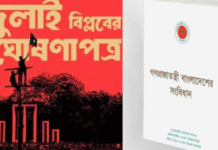SADEK Hossain Khoka’s use of incendiary language reasserts once more the distortion politics has of late been going through in our part of the world. His call for his party workers and supporters to be armed with axes and machetes to counter the ruling Awami League is not just a reminder of the frenzy with which Rwandan Hutus killed their Tutsi neighbours in 1994. It is also a hearkening back to some of the more sordid of periods in the history of the subcontinent.
There is, of course, the call for a use of the loggi and boitha by the Awami League at the end of the Bangladesh Nationalist Party’s last term in office. That call naturally did not go down well with the country, for it quite negated the idea of democracy we were looking to reinvent at a time when we were all busy trying to emerge from the darkness of the Hawa Bhaban era. And now this call to arms, the weapons being axes and machetes, by a man whose reputation has always rested on his soft-spoken nature, quite perplexes us.
But, again, must we be surprised at all given the long, dark story of politics in the Indian subcontinent? In the 1960s, as we have said so many times before, Field Marshal Ayub Khan informed a shocked Pakistan that if Sheikh Mujibur Rahman and the Awami League went ahead with their Six-Point demand for autonomy, the state would not hesitate to employ the language of weapons against them. In the end, of course, Ayub walked away into the evening without using those weapons. But his successor Yahya Khan made sure that weapons were used, and massively, against the Bengalis. His army ended up killing three million of them.
Given such historical precedents, you do not need great intelligence to understand why a call to axes and machetes should send down a shiver through our collective spine. In late February 1971, as people in both wings of Pakistan prepared to have their newly elected national assembly meet in Dhaka, Zulfikar Ali Bhutto served the warning that any West Pakistani lawmaker who travelled to East Pakistan would have his legs broken. Years later, as Pakistan’s prime minister, Bhutto proved that he could indeed break people’s legs. He had his goons physically assault and maim one of his earliest allies, J.A. Rahim, when the latter inadvertently sneered at Bhutto’s feudal mentality.
Indiscreet language in politics has always led to disaster, or to results that have caused much distress among people. The Shiv Sena’s Bal Thackeray remains a clear instance of how communal politics endangers the lives of men and women everywhere. He hated Muslims, just as there are hordes of Muslims who see everything wrong with Hindus and Hinduism. And he once recommended that Muslims in India be pushed into the sea or kicked out of the country. In Pakistan and even in Bangladesh, there are rabid Muslims for whom all other religions are anathema.
Which brings you to the matter of the sheer happiness with which Huseyn Shaheed Suhrawardy, as prime minister of Bengal, declared a province-wide holiday on August 16, 1946 to observe the Muslim League’s Direct Action Day. The result was four days of murder and mayhem that left thousands of Hindus and Muslims dead on the streets of Calcutta. Suhrawardy’s apologists are of course all over the place, but the fact is that the man knew what he was doing. Writing in The Statesman on August 5, 1946, he stated his goal thus: “Bloodshed and disorder are not necessarily evil in themselves, if resorted to for a noble cause. Among Muslims today, no cause is dearer or nobler than Pakistan.”
The cause may have been understandable. The language was not. The ramifications of it were horrendous.
In 1968, despite being a member of the Conservative Party shadow cabinet in Britain, Enoch Powell predicted ‘rivers of blood’ in the United Kingdom if immigration went on unchecked. That statement was properly seen as a manifestation of racism; and Powell paid the price. He was promptly sacked by opposition leader (and subsequently prime minister) Edward Heath. It was Powell’s language that did the damage.
And language often can be insulting. Mohammad Ali Jinnah did not do himself any favours when he denigrated the scholar Moulana Abul Kalam Azad as the show boy of the Congress or when he refused to shake hands with him. History has reserved a higher perch for Azad than for Jinnah. In similar fashion, when Iskandar Mirza threatened to shoot Moulana Abdul Khan Bhashani ‘like a dog’ in the 1950s, he was only exposing the crudity that underlined his personality. Mirza died in dishonourable exile. Bhashani would go on to earn his place in history.
There was the usurper Khondokar Moshtaque Ahmed cheerfully celebrating Bangabandhu’s assassins as ‘shurjo shontan’ (children of the sun). He was insulting the sun and the country. Anwarul Alam, in his recent book on the Rakkhi Bahini, gives us a new side to General M.A.G. Osmany. New in his position as Moshtaque’s defence adviser in August 1975, Osmany demands to know from Alam and his Rakkhi Bahini colleague: “How many Hindus are there in the Rakkhi Bahini?” That is shocking, for Alam, for all of us, because Osmany had never before asked such loaded questions.
And speaking of loaded, damaging language, we do not forget General Yahya Khan’s hubris as he informed Pakistanis on March 26, 1971 of what had happened in Dhaka in the preceding few days. Bangabandhu Sheikh Mujibur Rahman, he said in much anger, had committed treason. “This crime”, he warned, “will not go unpunished.”
One can be a prisoner of one’s language. As he prepared to leave Korea, General MacArthur told the world: “I shall return.” He never did. Asked by newsmen if he would seek a second term in the White House, Lyndon Johnson said, with some degree of hauteur: “I shall cross the bridge when I come to it.” The bridge was already burning in Vietnam. And that second term never came to pass.
Years ago, General Ziaur Rahman told Bengalis he would make politics difficult. He did. And now his loyalist Khoka promises to dress politics in murder. He just might have done it.
Source: The Daily Star










